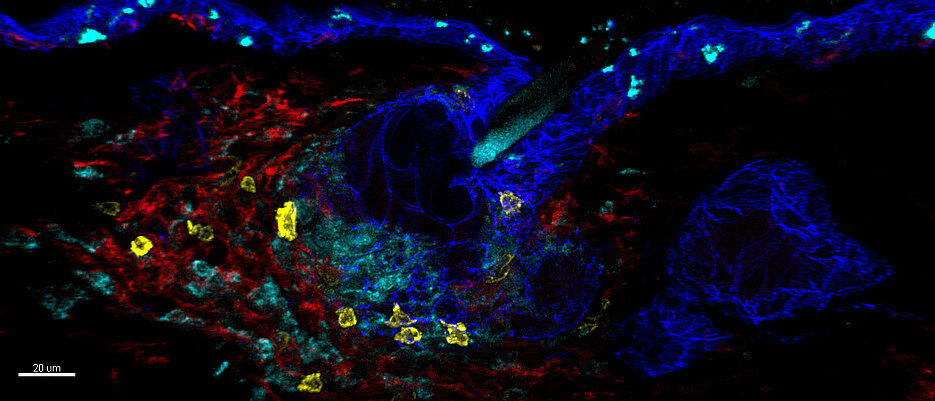Innate immune cells are more adaptable than previously thought
01/09/2024Natural killer cells of the innate immune system can permanently remain in infected tissue and thus contribute to immunological memory. Researchers at the University of Würzburg have now discovered this.

A team of the Max Planck Research Group for Systems Immunology led by Würzburg immunologist Georg Gasteiger has published surprising findings about cells of the innate immune system, the natural killer cells, in the journal Immunity: During local infections in the skin, these cells can migrate into the tissue and remain there long-term. In doing so, they contribute to the immunological memory. The fact that lymphocytes of the innate immune system possess these abilities was not known until now.
Natural killer cells are part of the innate immune defense.
The immune system consists of an innate and an acquired part. The innate immune system protects us from germs from birth, while the adaptive immune defense is learned over the course of life: It demonstrates significant adaptability to new or altered pathogens and forms the so-called immunological memory. This allows our body to react more quickly to repeated contact with pathogens, as is exploited in vaccinations, for example.
Natural killer cells (NK cells) are lymphocytes of the innate immune system. Their name says it all – they eliminate virus-infected cells or tumors. Therefore, they have been extensively studied in the field of tumor therapy. A less-known area until now has been their role in tissues.
Surprising adaptability in skin immune defense
The skin is not initially populated with these specialized immune cells at birth. The Würzburg Max Planck Research Group's team demonstrated that NK cells only settle there after an infection. "We were surprised that a specialized subset of NK cells that migrate to the skin during an infection also remain there long-term," describes Christin Friedrich, first author of the study and postdoctoral researcher in the research group. She adds, "We previously primarily knew about immune cells settling in tissues long-term after infections from cells of the adaptive immune system, such as T cells."
Previously, it was believed that natural killer cells, belonging to the innate immune system, were rather short-lived cells that mainly circulate in the blood and only temporarily move into inflamed tissues during an infection. "We were able to show that these cells can react much faster during a second infection because they are already present at the site," explains Georg Gasteiger, head of the research group. So, the innate system seems to learn more than previously thought and can adapt in tissues to recurring threats from pathogens. "Perhaps these mechanisms were established early in evolution, even before the adaptive system developed" speculates the immunologist.
Immune cells in shingles and erysipelas patients
In the next step, the scientists aim to verify their approach in human tissues and learn more about the underlying mechanisms. In collaboration with the University Hospital of Würzburg, they will examine natural killer cells in patients who have had shingles and erysipelas after the infection has been overcome. "We want to understand why these cells can only colonize specific tissue niches and what they need for it," says Georg Gasteiger. Understanding how NK cells function in different tissues could help target improvements in vaccinations and immunotherapies.
Max Planck Research Group for Systems Immunology
The Max Planck Research Group for Systems Immunology is a collaborative effort between the University of Würzburg (JMU) and the Max Planck Society (MPG) aimed at promoting excellent immunological research. Around 50 researchers from more than 20 countries are working together to understand the basis of a successful immune response against infectious agents, chronic inflammatory diseases, and tumors. Their ultimate goal is to develop new concepts and strategies for vaccines and immunotherapies.
To achieve this, the group is investigating the development and function of the immune system holistically at multiple levels. They are conducting high-resolution analyses of single molecules and cells, examining complex cellular networks within organs, and exploring systemic interactions in the body and with the environment. These research goals align well with the internationally visible research on infectious diseases and immunotherapies at the Würzburg Life Science Campus.
Publication
Circulating NK cells establish tissue residency upon acute infection of skin and mediate accelerated effector responses to secondary infection. Torcellan T, Friedrich C, Doucet-Ladevèze R, Ossner T, Solé VV, Riedmann S, Ugur M, Imdahl F, Rosshart SP, Arnold SJ, Gomez de Agüero M, Gagliani N, Flavell RA, Backes S, Kastenmüller W, Gasteiger G. Immunity. Published on Dec 28. DOI: 10.1016/j.immuni.2023.11.018. Epub ahead of print. PMID: 38157853.
Contact
Prof. Dr. Georg Gasteiger, Head of the Chair of Systems Immunology II, Phone: +49 931 31-89599, georg.gasteiger@uni-wuerzburg.de






